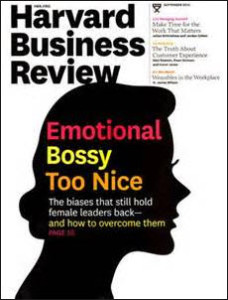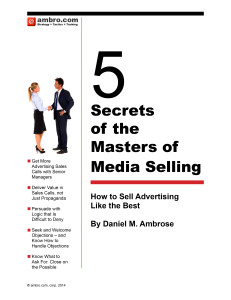I have prided myself my whole career for not being concerned about “gender issues” in the way I behave at work. I thought being a modern male meant treating everyone the same. Perhaps it was a weakness. But I was always just as comfortable with reporting to women as to men. My favorite boss was a woman. In fact she still is 😉 As a leader, I’ve always tried to have the same expectations of the men or women who worked for me. It didn’t seem hard to do that. I looked at “differences” as “individual” rather than gender-based.
So when I read the story in the Harvard Business Review about the need to approach selling differently when selling to women, I was very curious. Is this an issue I need to understand better? Do I need to learn about nuances of how to sell advertising to women versus men to teach advertising sales training at the highest level?

Harvard Business Review; Women as Leaders
“We know from decades of research that women tend to behave differently than men as shoppers in business-to-consumer (B2C) settings. Take as one small example “Gender differences in information search strategies for a Christmas gift,” a study published in 1984 in the Journal of Consumer Marketing. It found that “females appeared to comprehensively acquire in-store information, whereas males appeared to heuristically limit their search to a smaller subset of in-store information.” (read more here)
The story focuses on sales situations that are similar, if not the same, as how to sell major account advertising in national or local ad sales situations. These are group decisions where the sales process may touch individuals first, then culminate in a major presentation to a group.
The authors, Cathy Benko and Bill Pelster, both of Deloitte Consulting, make the astute observation that women tend to make decisions differently than men. So it would stand to reason that sensitivity in the management of a sales conversation should be the watch-word.
Benko and Pelster assert that “women see a big meeting with a potential service provider as a chance to explore options in collaboration with an expert resource, while men see that even as a near-final step in the process.” Women seem to show more “willingness to reevaluate or modify their original request” and are more interested in hearing everyone’s thoughts before deciding.
As advertising sales managers the gender composition of our sales prospects varies. But across the entire media industry, it would seem that more then half of media buyers are women. Perhaps learning more around this issue is important. What do you think? How do you plan your sales calls differently when meeting with women versus men? Can you use an agenda to better modulate the sales conversation to accommodate for more exploratory discussion at the right time?

